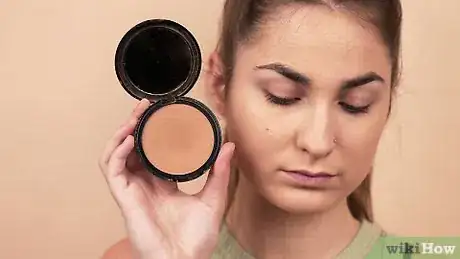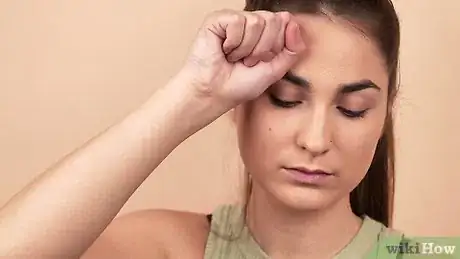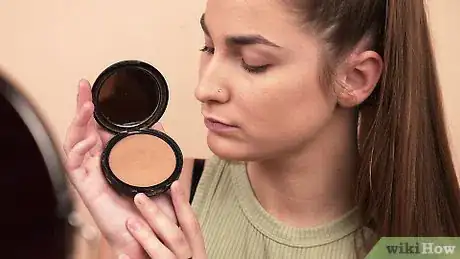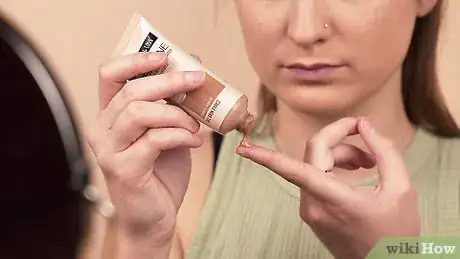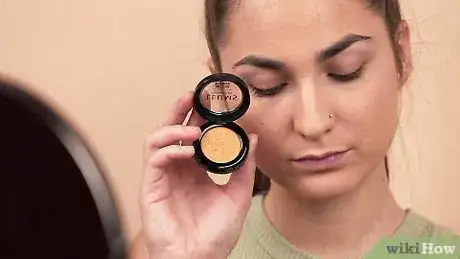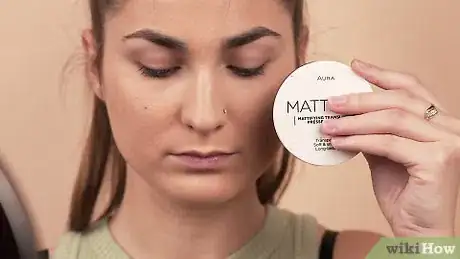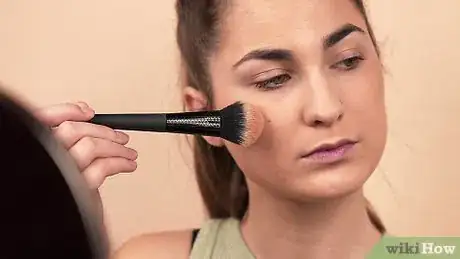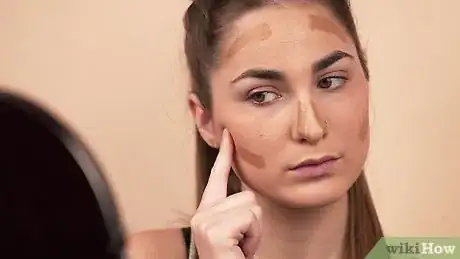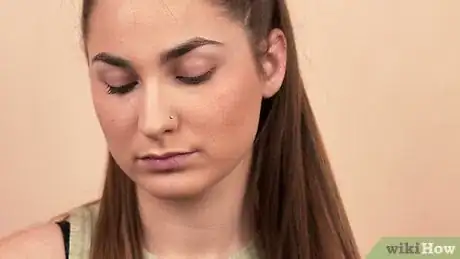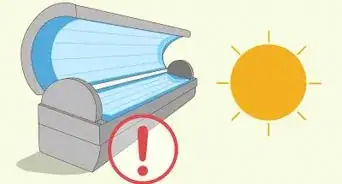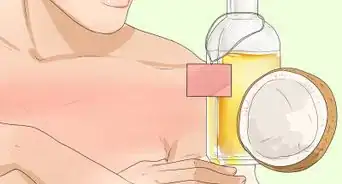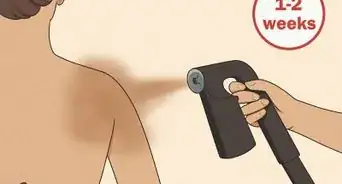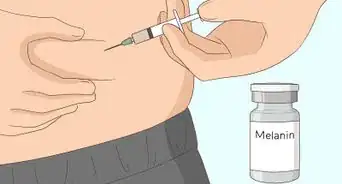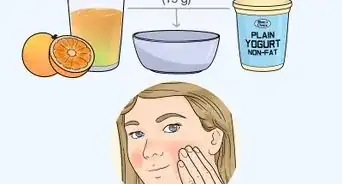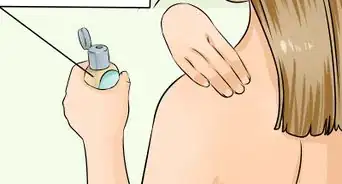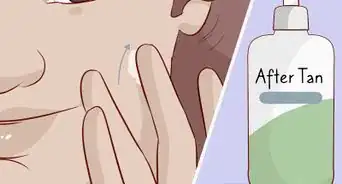This article was co-authored by Devorah Kuperland and by wikiHow staff writer, Amy Bobinger. Devorah Kuperland is a Makeup Artist and the Founder of Glam By Dev, a New York City-based business specializing in bridal, special events, and editorial campaigns. Devorah has over five years of professional makeup consulting experience and her work has been featured in New York's Bridal Fashion Week.
There are 14 references cited in this article, which can be found at the bottom of the page.
This article has been viewed 11,045 times.
If you're craving a sun-kissed glow but you don't want to expose yourself to damaging UV rays, bronzer might be just the thing you're missing from your makeup bag. But with so many options at the makeup counter, how do you know what to choose? Luckily, it's much easier to narrow down your choices once you know what color will look best on you and what type of formula you want to try—and we're here to answer any questions you might have during the process.
Steps
How do I find the right shade of bronzer?
-
1Choose a color that's 1-2 shades darker than your skin tone. Your skin tone is pretty easy to figure out—it's just how light or dark your skin is. Stick to a color that's just a little darker than your natural tone to get a look like you've been out in the sun.[1] For example:
-
2Then, narrow down the color based on your undertone. The easiest way to figure out your undertone is to look at the veins on the inside of your wrist. If they're bluish or purple, you probably have a cool undertone. If your veins look greenish, your undertone is probably warm. And if you can't really tell, you likely have a neutral undertone.[4] This can help you narrow down your bronzer options:
- If you have a warm undertone, go with golden shades.[5]
- If your undertones are cool, go with warm shades like peach, taupe, or honey.
- If you have a neutral skin color, you can wear almost anything!
Should I get cream or powder bronzer?
-
1Use powder if you have normal, combination, or oily skin. Most of the bronzers you find are likely to be pressed powders. These easy-to-use options are great for almost any skin type, although they can look a little cakey if your skin gets really dry.[6]
- If you do have dry skin, you can still use powder bronzer, as long as you use a silky-feeling powder and moisturize your skin really well before you put on your makeup. Let the moisturizer soak in before you start layering on other products, though, so your makeup doesn't look too heavy.
-
2Go with cream or liquid if your skin is on the dry side. Cream and liquid bronzers give your skin a light, dewy look, so they're great for adding a glow to normal to dry skin. Just make sure not to apply these on top of any powder products—you'll get a patchy look instead of the natural tan you're going for.[7]
- Liquids and creams tend to have a little bit of a shine to them, so avoid using them if your skin tends to get oily or shiny throughout the day.
Should I go with matte or shimmer bronzer?
-
1Try something slightly shimmery if you want a soft glow. Bronzer is meant to make you look like you've been out in the sun all day—and when you're tan, your skin tends to get glowy. Using a bronzer with just a little bit of shimmer will help you get this look without any of that pesky skin damage. Also, shimmers are great for darker skin tones since they tend to show up better than matte formulas.[8]
- Look at the size of the sparkly flecks. Larger flecks will reflect more light, making the shimmer more noticeable, while smaller flecks will have a more subtle look.
- While super-shimmery bronzer doesn't look very natural during the day, try using it to create a dramatic look for a fun night out!
- If you use a shimmery bronzer, don't use blush or highlighter that have shimmer, because that can be too much sparkle.[9]
-
2Go with matte bronzer for a subtle look or if you have oily skin. If you put shimmery products on oily skin, it can make you look shinier—and it's just going to call attention to the fact that you're wearing bronzer in the first place. For a more natural look, opt for matte bronzers. You'll get that sun-kissed look while still helping your skin look its best.[10]
- If you want to add the barest bit of a glow, look for a product with a satin finish.
How do you make bronzer look natural?
-
1Apply bronzer wherever the sun would naturally hit your face. Think about where the light would hit you if you were standing outside in the middle of the day, then dust bronzer over those areas. For instance, apply it along the hairline on your forehead and on your temples, the tops of your cheekbones, and the bridge of your nose. Also, put a little on the very tip of your chin, then blend it along your jawline, down into your neck, and back into your ears.[11] [12]
-
2Build the color gradually so the results look natural. If you're heavy-handed when you apply bronzer, it can give you an unnatural orangey look—not quite the day-at-the-beach look you're going for. To avoid that, apply your bronzer in light layers, and check how it looks in natural lighting before you add more.[15]
- If you accidentally apply too much, blend the bronzer with a clean powder brush or a dampened makeup sponge.
What tools should I use to apply my bronzer?
-
1Use a firm, fluffy brush to apply powder bronzer. Powder bronzers are the most common, and they're also the easiest to apply. Just sweep your brush across the top of the powder, tap it on the side of the container to get rid of any excess, and dust the bronzer onto your skin.[16]
-
2Try your fingers, a sponge, or a foundation brush for cream bronzer. If you have a cream bronzer, dab a makeup sponge or a synthetic foundation brush lightly across the top of your product. You could also just use your fingers, if you prefer. Then, gently tap the product into your skin with a stippling movement. Keep tapping until it's completely blended into your skin.[17]
-
3Apply liquid bronzer with your fingers for the most control. Liquid bronzer can seem a little intimidating, but you really just have to apply a little to your fingers, then dot it into your skin. However, liquid bronzers can dry in a hurry, so just apply a little at a time and blend quickly.[18]
- You could also apply it to a dampened beauty blender, if you prefer.
What is the difference between bronzer and contour?
-
1Contour is meant to mimic shadows on your face. It's designed to sculpt your face, helping to enhance or disguise different areas. For instance, if you have a wide nose, you might contour along the sides of it to make it look more narrow. Because it's supposed to look like natural shadows on your face, contour should always be matte.[20]
-
2Bronzer is meant to give you a warm glow. When you apply bronzer, it should give you a look like you've been out in the sun all day. It can be either matte or shimmery, and it's used to highlight the highest areas of your face—or the parts that would tan naturally in the sunlight.[21]
Expert Q&A
-
QuestionWhere do you apply bronzer on your face?
 Devorah KuperlandDevorah Kuperland is a Makeup Artist and the Founder of Glam By Dev, a New York City-based business specializing in bridal, special events, and editorial campaigns. Devorah has over five years of professional makeup consulting experience and her work has been featured in New York's Bridal Fashion Week.
Devorah KuperlandDevorah Kuperland is a Makeup Artist and the Founder of Glam By Dev, a New York City-based business specializing in bridal, special events, and editorial campaigns. Devorah has over five years of professional makeup consulting experience and her work has been featured in New York's Bridal Fashion Week.
Makeup Artist Apply your bronzer on areas where the sun would normally hit. For instance, sweep the bronzer onto your hairline on your forehead and temples, on the bridge of your nose, on the tops of your cheekbones, and the tip of your chin. Alternatively, draw a giant "3" with your bronzer from your temples to the hollows of your cheeks to your jawline.
Apply your bronzer on areas where the sun would normally hit. For instance, sweep the bronzer onto your hairline on your forehead and temples, on the bridge of your nose, on the tops of your cheekbones, and the tip of your chin. Alternatively, draw a giant "3" with your bronzer from your temples to the hollows of your cheeks to your jawline.
References
- ↑ https://www.teenvogue.com/gallery/how-to-select-the-best-bronzer-for-your-skin-tone-care-of-the-pros
- ↑ https://youtu.be/kgrTW4p_kUw?t=319
- ↑ https://www.vogue.com/slideshow/best-bronzers-darker-skin-tones-tricks-techniques-undertones
- ↑ https://www.essence.com/beauty/how-to-determine-skin-undertone/
- ↑ https://www.paulaschoice.com/expert-advice/how-to-choose-and-apply-bronzer.html
- ↑ https://www.cosmopolitan.com/uk/beauty-hair/makeup/news/a35292/cream-powder-makeup-which-is-better/
- ↑ https://www.cosmopolitan.com/uk/beauty-hair/makeup/news/a35292/cream-powder-makeup-which-is-better/
- ↑ https://stylecaster.com/beauty/bronzer-on-dark-skin/
- ↑ https://youtu.be/z_0I-rTwAwI?t=34
- ↑ https://www.goodhousekeeping.com/beauty/makeup/a33010/how-to-apply-bronzer-mistakes/
- ↑ Devorah Kuperland. Makeup Artist. Expert Interview. 16 April 2020.
- ↑ https://www.teenvogue.com/gallery/how-to-select-the-best-bronzer-for-your-skin-tone-care-of-the-pros
- ↑ Devorah Kuperland. Makeup Artist. Expert Interview. 16 April 2020.
- ↑ https://youtu.be/z_0I-rTwAwI?t=74
- ↑ https://www.paulaschoice.com/expert-advice/how-to-choose-and-apply-bronzer.html
- ↑ https://www.teenvogue.com/gallery/how-to-select-the-best-bronzer-for-your-skin-tone-care-of-the-pros
- ↑ https://stylecaster.com/beauty/different-bronzer-types/
- ↑ https://www.paulaschoice.com/expert-advice/how-to-choose-and-apply-bronzer.html
- ↑ https://youtu.be/kgrTW4p_kUw?t=149
- ↑ https://stylecaster.com/beauty/bronzer-on-dark-skin/
- ↑ https://www.goodhousekeeping.com/beauty/makeup/a33010/how-to-apply-bronzer-mistakes/
- ↑ https://www.goodhousekeeping.com/beauty/makeup/a33010/how-to-apply-bronzer-mistakes/
